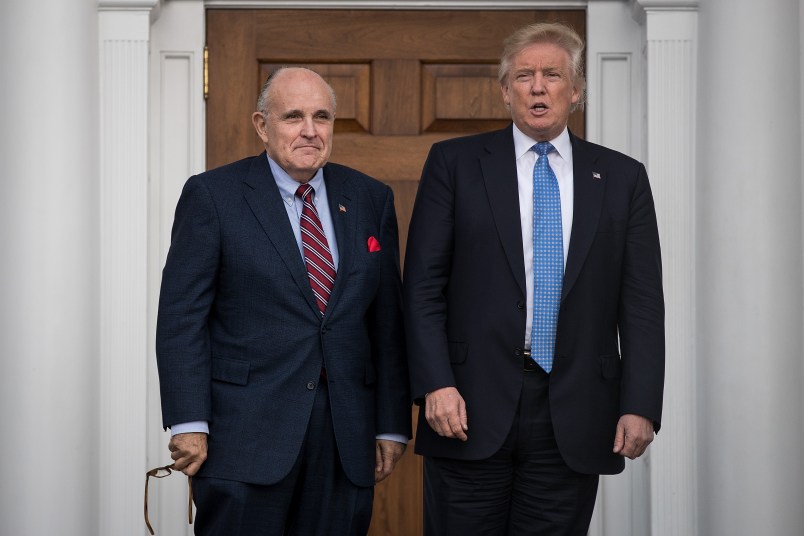President Donald Trump may have found a way to break new ground in U.S. political history this summer.
His campaign — conducted in part via Rudy Giuliani — to convince Ukrainian President Volodymyr Zelensky to open a criminal investigation into the son of Democratic presidential frontrunner Joe Biden creates a nearly unprecedented matrix of ethical, legal, and national security concerns, each of which individually could be unprecedented in their ability to corrupt, experts told TPM.
A former midlevel official in the Obama administration who requested anonymity to speak freely told TPM that the situation left the country in “uncharted” legal territory.
“When you withhold military assistance to a country at war with Russia because you want to compel the country to launch a political investigation into your opponent, that’s outside the bounds of anything that’s happened in U.S. political history,” the official said.
With each power that the presidency offers, there are countervailing sources of corruption.
On Friday afternoon, the Wall Street Journal reported that Trump asked Zelensky eight times on a July 25 phone call to work with Giuliani to investigate Hunter Biden’s activities in Ukraine.
The call and and activities around it are reportedly the subject of a whistleblower complaint filed from within the intelligence community, which became the subject of controversy this week after the Office of the Director of National Intelligence took the norm-busting, and possibly illegal, step of withholding the information from Congress.
Both the Wall Street Journal and Washington Post reported on Friday that $250 million in security assistance being withheld did not come up as a quid pro quo on the call. Many details of the call between Zelensky and Trump remain unclear.
The secrecy around the complaint underscores the nature of the allegation against Trump: that he used the U.S. foreign policy apparatus to attempt to deputize a foreign leader into helping his reelection campaign.
Larry Noble, a former FEC general counsel who works at the Campaign Legal Center, told TPM that the allegations raised profound concerns around potential conflicts of interest.
“You don’t want a president making foreign policy decisions in exchange for his reelection,” Noble said. “You want him doing what’s in the best interest of the country, you don’t want him doing what’s in the best interest of his campaign.”
The former Obama administration official told TPM that the allegations appeared to constitute “abuse of office.”
“There’s a lot of concern that every single tool in the foreign policy toolbox is being used to try and achieve a partisan political outcome,” the official added.
Noble went on to suggest that the allegations could amount to a campaign finance violation, pointing out that part of why Special Counsel Robert Mueller did not bring campaign finance charges against members of the Trump campaign was because he found that it wasn’t clear those involved knew it would be illegal to solicit help from a foreign country.
“Here, nobody can claim they didn’t know it would be illegal,” Noble said.
Kathleen Clarke, a law professor specializing in government ethics at Washington University in St Louis, said that if Trump was withholding aid to Ukraine as leverage for dirt on Biden, as has been suggested, he may have broken the law.
Clarke pointed to the criminal bribery statute and noted that, unlike other conflicts of interest laws, this one applied to the President.
The federal law prohibits public officials from corruptly demanding something of value in exchange for being influenced in the performance of an official act.
“These allegations are like a prima-facie case of bribery,” she said, arguing that a decision regarding aid fits the law’s definition of an official act, and that dirt on Biden would be a thing of personal and political value to Trump.
And unlike Trump’s public calls for Russian help in the 2016 — and the question of whether they amounted to a campaign finance violation — these allegations, if true, would be a much clearer case, Clarke said.







The switching system in the precedent’s head is apparently not working very well:
To quote the man: “The conversation I had was largely congratulatory. It was largely corruption—all of the corruption taking place,” Trump said. (https://slate.com/news-and-politics/2019/09/trump-ukraine-campaign-finance-crime.html)
Looks like the train of thought tracking what’s actually going on got switched onto the public presentation track.
With such well-tuned mental processes, it’s hardly surprising his lawyers don’t want him near a prosecutor.
Saw someone on MSNBC this morning saying that Barr/Trump will argue that his intentions were to fight corruption which makes it OK.
I really hope this defense doesn’t fly.
This is the moment to defend the Bidens loudly and clearly. The media will be judged on how strongly they spell out the facts in the Bidens defense and how strongly and clearly they bat back the smears.
People keep talking and writing about Trump as if he fits, albeit uneasily, into established categories and is following, albeit inconsistently, established rules and procedures. That’s the assumption: against a background of legitimacy, here are the discrete things that he and his administration are saying and doing that are irregular. It’s driving me crazy.
There’s nothing about Trump and his administration that is normal. Stop normalizing. He’s not a law-abiding guy who sometimes speeds on the highway and cheats in a nickel-and-dime way on his taxes. He’s the mentally deranged guy wandering up and down the sidewalk outside your kid’s school, waving a knife and exposing himself.
Whether you’re a government official, an ex-government official, a journalist, or what have you — we have a president who is functionally insane, regularly engages in unconstitutional and sometimes criminal behavior, and is an existential threat to the world.
So ignorance of the law is a legal defense? Someone will need to explain that one to me.